Is Job Scraping Legal? Yes, when done in compliance with the law
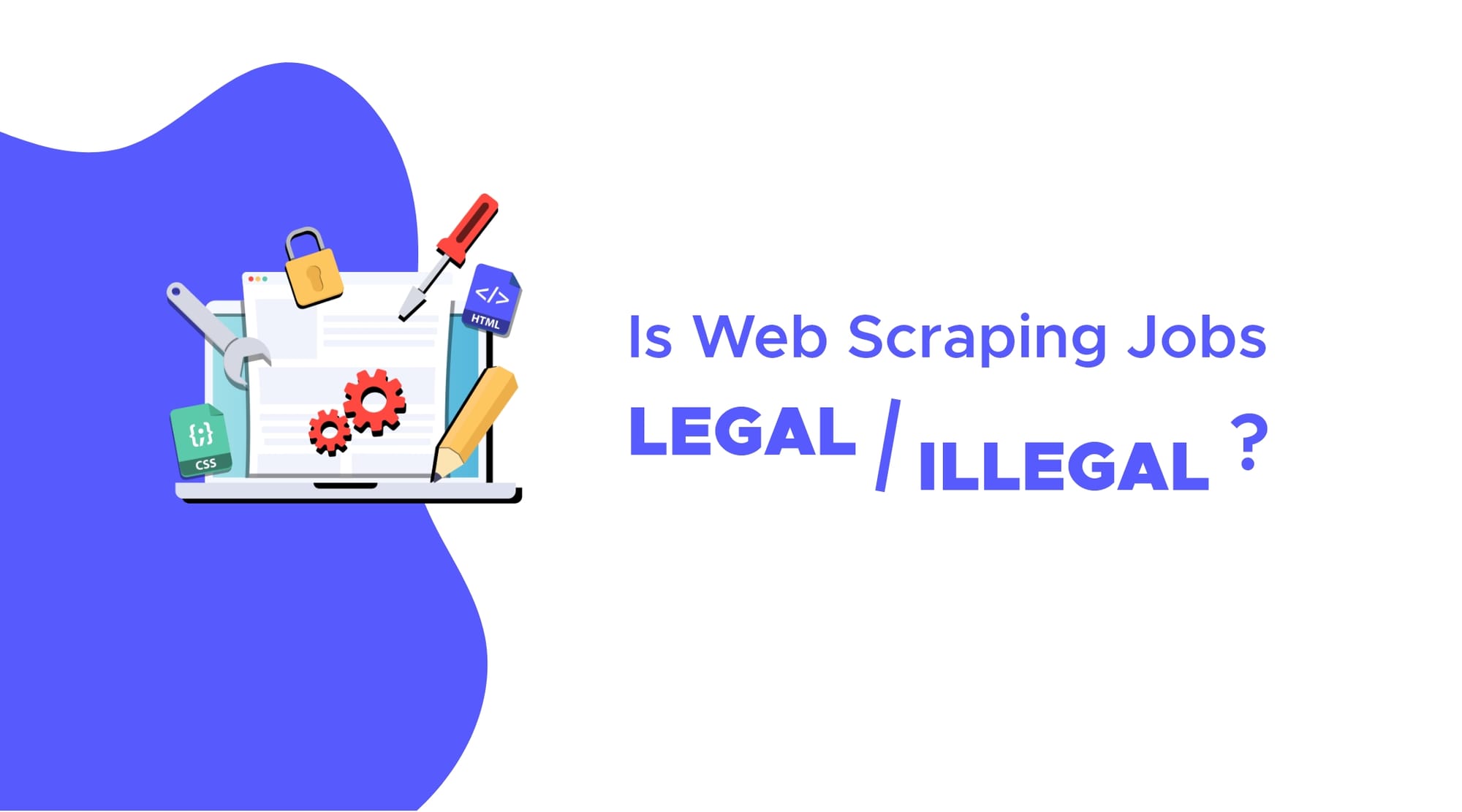
Job scraping, or the process of extracting a job posting from popular job boards like LinkedIn and Indeed, seems to question time and again whether it is web scraping legal or not. The Electronic Frontier Foundation says that the U.S. Court of Appeals has already ruled that scraping public data is not a crime.
Yet, the legality of web scraping often changes based on the platform and region. While the very act of web scraping public data is generally allowed, breaching a site's Terms of Service or infringing on laws like the Computer Fraud and Abuse Act of the U.S. and General Data Protection Regulation of the EU will get them into legal trouble.
For businesses engaged with job data, a deep understanding of these existing laws is essential. Job boards impose stringent terms of service agreements, while regulations such as the CFAA and GDPR govern web scraping practices. In the United States, the CFAA renders web scraping illegal if it entails circumventing security measures or site restrictions. Meanwhile, in the European Union, the GDPR safeguards personal data, including that contained within job postings, thereby complicating the act of web scraping.
The following article examines the legal and ethical concerns involving web scraping, coupled with best practices that will help make the processes compliant and reduce potential penalties when dealing with job market data. The web scraping community regularly discusses these issues (See Quora).
Is Scraping jobs legal or illegal ?
Passive vs. Active Scraping: Public vs. Private Data
Before delving into the legality of web scraping, it is crucial to differentiate between passive and active scraping activity, as well as public and private data.
Public data does not require login passwords or special permissions, and examples include job postings on open web pages.
All private information requires authentication, for instance, via account login or restricted website areas.
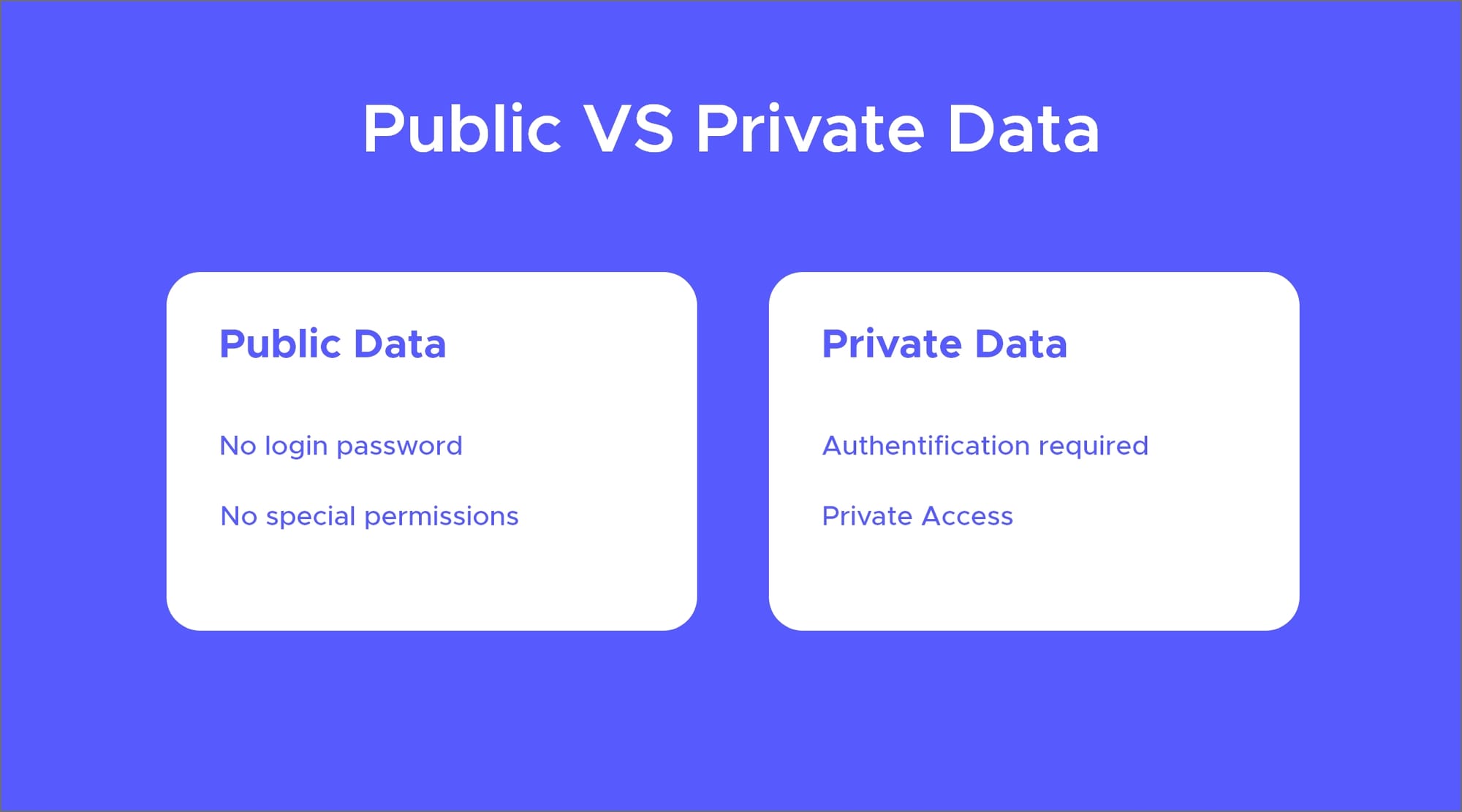
Passive scraping entails the collecting data of public data while adhering to existing security measures.
Active scraping involves creating fake accounts, bypassing CAPTCHA systems, or using other more invasive methods to reach private data. This often runs in contradiction to the site owner's Terms of Service and can lead to potential legal issues regarding data protection laws. Active scraping activity methods can make web scraping illegal, especially when they exceeds authorized access or violate a website’s Terms of Service or data protection laws.
What does make Web Scraping Legal ?
Web scraping can indeed be perfectly legal when conducted within appropriate boundaries. For instance, gathering only data scraped publicly available without infringing upon a website owner's terms of service (TOS) or employing unauthorized methods is generally permissible.
In truth, the U.S. Court of Appeals has determined that web scraping publicly available data does not constitute an illegal act, as long as no technical barriers or restrictions are circumvented.
When is Web Scraping Illegal ?
However, web scraping can turn illegal, depending on the jurisdiction it falls in and sometimes methods of implementation. Understanding web scraping laws is crucial to avoid potential legal issues and ensure compliance with data protection regulations. There are no global legislations governing web scraping, so scraping legal can change from one country to another or from one region to another.
Besides, web scraping copyrighted data or confidential information may violate a site's TOS using automated software that bypass site protection such as those through login requirements or CAPTCHA. In this case, claims include intellectual property rights infringement or breaches of copyrighted data. Many job boards deny scraping, even of public data.
Breaking these rules may mean lawsuits or more often bans depending on the local web scraping laws that govern a website and what the website owner says in their terms and conditions.
Copyright and Job Scraping
Copyright is one of the major concerns when web scraping job postings. Many job postings include copyrighted materials, and the extraction of such materials without permission may lead to copyright infringement. While particular uses, like data analysis or research, might be covered under fair use or other legal exemptions, there is still some inherent risk in Web scraping of copyrighted material without prior permission.

The first question that somebody would ask while trying to scrape job information is: does the content that you want to scrape fall under digital millennium ? And if your answer is yes, you need to get permission from the owner or make sure your usage falls within "fair use" rules.
TOS and Scraping Jobs
Another thing, besides copyright, is the TOS of the websites that you will scrape. Many job boards have strict rules that either ban scraping services completely or limit how you will use the scraped data you gather. That is why, before scraping any job board, you should read and understand the platform's TOS to avoid breaking any rules.
Some job listing websites have specific terms that forbid scraping. Others may allow scraping for certain purposes like research or personal use. However, purchasing scraped data without verifying its origin may also pose legal risks.
Web scraping Laws by Jurisdiction (Country by Country)
When it comes to web scraping, the complexities can be highly varied dependent on your source. Let's break this down by country and region in which you are operating, so that you are correctly informed about what is legal and what is not and where the ambiguities lie.
Follow me as this is important to get right! Despite the legal complexities, web scraping remains a significant aspect of web traffic, illustrating its prevalent role in both positive and negative contexts.
United States (CFAA)
In the United States, the Computer Fraud and Abuse Act (CFAA) holds significant authority in the regulation of web scraping, particularly when it comes to job scraping. Here’s the crux of the matter: scraping public job postings is generally acceptable. However, the moment you circumvent technical barriers—such as CAPTCHAs—or extract data from restricted areas without consent, you find yourself in violation of the CFAA. And that is no trivial matter. The law fundamentally criminalizes unauthorized access to systems.
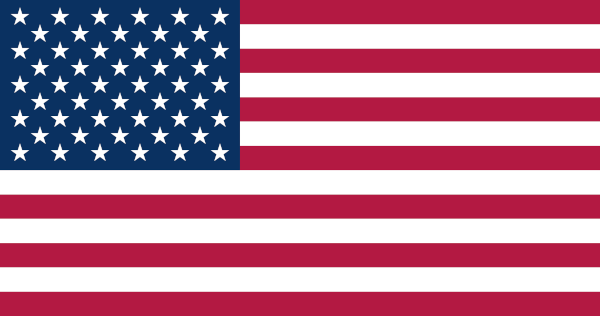
Next, let's see how the DMCA, or digital millennium copyright act, fits into the picture. Well, if you find yourself scraping copyrighted content without permission, you are in hot water. The DMCA primarily concerns preventing the circumvention of technological protections, and that's where it gets complicated-violation of such protections may land you in legal troubles.
EU and UK (GDPR)
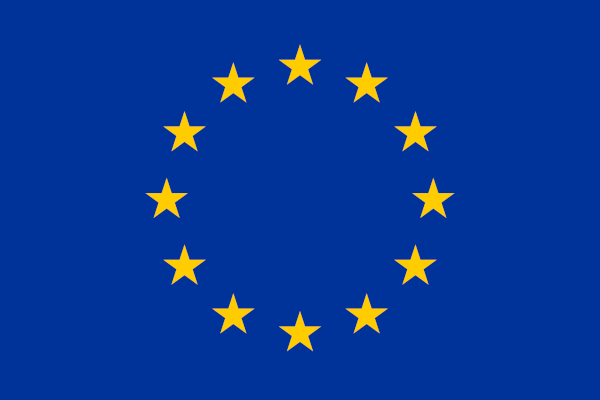

Now, in the EU and UK, job scraping is an entirely different story due to the General Data Protection Regulation (GDPR). This is a law on the protection of personal data; therefore, if in scraping job postings you also pick up personal information such as names and emails, then you have really got to watch out. That being said, with public job postings that contain no personal data, you generally are on safer ground.
France (Loi Informatique et Libertés)

Job scraping in France is subject to the Loi Informatique et Libertés, which works in conjunction with the already-mentioned GDPR but provides further protection. If personal information is being collected as part of your scraping, you are bound by very specific regulations. The CNIL, or France's data protection authority, is not one to be underestimated, and unauthorized data collection, even if from public access job postings, might lead to fines.
Canada (PIPEDA)

In Canada, it is the Personal Information Protection and Electronic Documents Act, PIPEDA. It covers the personal data collected during commercial activities, and that includes job scraping. Should these job postings contain personal information, you are supposed to get consent or follow exemptions under the law. Public data scraping may usually be allowed, but mishandling personal data might get you into some form of trouble-fines.
Other Jurisdictions
How about the rest of the world? It is a mixed bag, really. Some countries have strict data privacy laws similar to the GDPR, while other countries are more relaxed. A very important thing that this teaches is to always look at the local legislation when doing job posting scraping in an area.
Is Scraping Leading job boards legal?
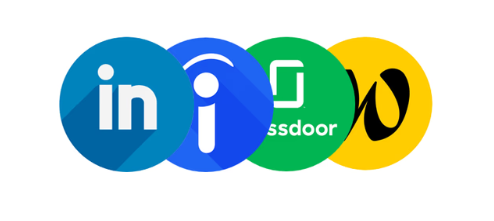
The idea of web scraping job postings off big boards like LinkedIn, Indeed, or Glassdoor can be very tempting; it also comes with a special set of legal risks. All the above-named job boards have certain Terms of Service that let one define how their data is to be accessed and made use of.
While some public data may seem to fall into a gray area legally, actually web scraping it commonly violates these TOS-and there's the rub. Scraping may have legal consequences, depending on the platform and method applied.
Web scraping tools are so easily available that everyone seems to be extracting data from websites irrespective of whether they are technically sound or not. Of course, just because you can scrape data does not mean you should if you are not following the rules laid down. Let us explore some key information you should know about scraping with a few of the leading job boards:
Is it legal to scrape job postings from LinkedIn?
In the case of LinkedIn, job posting scraping is not allowed if it is against their Terms of Service—and it usually is. Certainly, it forbids the use of automated tools for gathering job postings or any sort of data. Surprise twist: in the case of hiQ Labs v. LinkedIn, the legal precedent was set that it appears to not be illegal to scrape data if it is public and no technical defenses like CAPTCHAs were breached.
Is it illegal to scrape indeed?
Indeed stands as another significant contender in the field, governed by stringent regulations. Their Terms of Service explicitly prohibit scraping, particularly when it involves bots or automated tools. While it might appear permissible to scrape public job postings without circumventing their safeguards, Indeed diligently monitors and blocks any unauthorized attempts at data extraction. For those seeking legitimate access to job data, Indeed’s API presents a far safer alternative.
Is it legal to scrape Glassdoor?
For Glassdoor, the answer is pretty straightforward: no. Glassdoor’s TOS specifically prohibits scraping, and they’ve even taken legal action against scrapers in the past. So unless you’ve got permission, scraping Glassdoor is definitely not recommended.
Legality of web scraping Other Job Boards (Monster, SimplyHired)?
The rules are usually different when it comes to other job boards like Monster or SimplyHired. In fact, each one of them has its own terms of service, and you need to check on those of the particular job board you want to target before you actually start scraping. Some will allow just limited scrapings, while others will have very strict bans.
In other words, scraping job boards can be a very serious legal minefield. You need to understand the rules on each platform before you scrape them.
Legal and Financial Risks: The Reality Behind Regulations and Terms of Service
Job scraping bears legal and financial risks, most especially when looked at with the TOS set by massive platforms such as LinkedIn, Indeed, and Glassdoor. While data scraped has been highly fruitful, it is in a legal grey area, and these platforms have taken actions against web scrapers. However, many court decisions have gone in favor of scrapers, to a large extent, when the data scraped used for web scraping is available publicly. Let's consider a few cases that illustrate the tricky legal landscape in job scraping.

Case 1: LinkedIn vs. hiQ Labs
In the high-profile case of LinkedIn v. hiQ Labs, LinkedIn had attempted, under the CFAA, to prevent hiQ from scraping public data. But fate played a different hand, and the U.S. Court of Appeals ruled in hiQ's favor to state that scraping of public data cannot necessarily be called breaching the CFAA provided no technical barriers have been bypassed.
This case set an interesting precedent: scraping of public data may indeed be legal--though the legal struggle continues to demonstrate this story is far from over.
Case 2: Indeed’s response to Scraping Without Permission
Indeed did go after some companies that scrape their platform without permission, including for public job postings. But when these cases go to court, business defendants argue that they didn't bypass technical barriers or otherwise violate CFAA and tend to win. Indeed blocks scraping, but legal precedent indicates that scraping public data doesn't always bring penalties, though businesses are still in violation of TOS.
Case 3: Glassdoor Lawsuits over Public Data
Glassdoor, in particular, is quite inflexible on scrapings; they can be far more sensitive to any of that tender information, like reviews and salaries. They've filed lawsuits over the practice, but courts more often than not ruled that scraping public job data does not break any laws. Glassdoor still keeps an eye out for scrapers who are unauthorized in their sight, which means while public data scraping may be legally allowed, scraping private or otherwise restricted data can result in consequences legally and financially.
Read more : What Recent Rulings in ‘hiQ v. LinkedIn’ and Other Cases Say About the Legality of Data Scraping
Ethical Considerations and Best Practices for Using Scraped Data Legally
If you’re planning to scrape job data, here are some best practices to ensure you stay on the right side of the law:
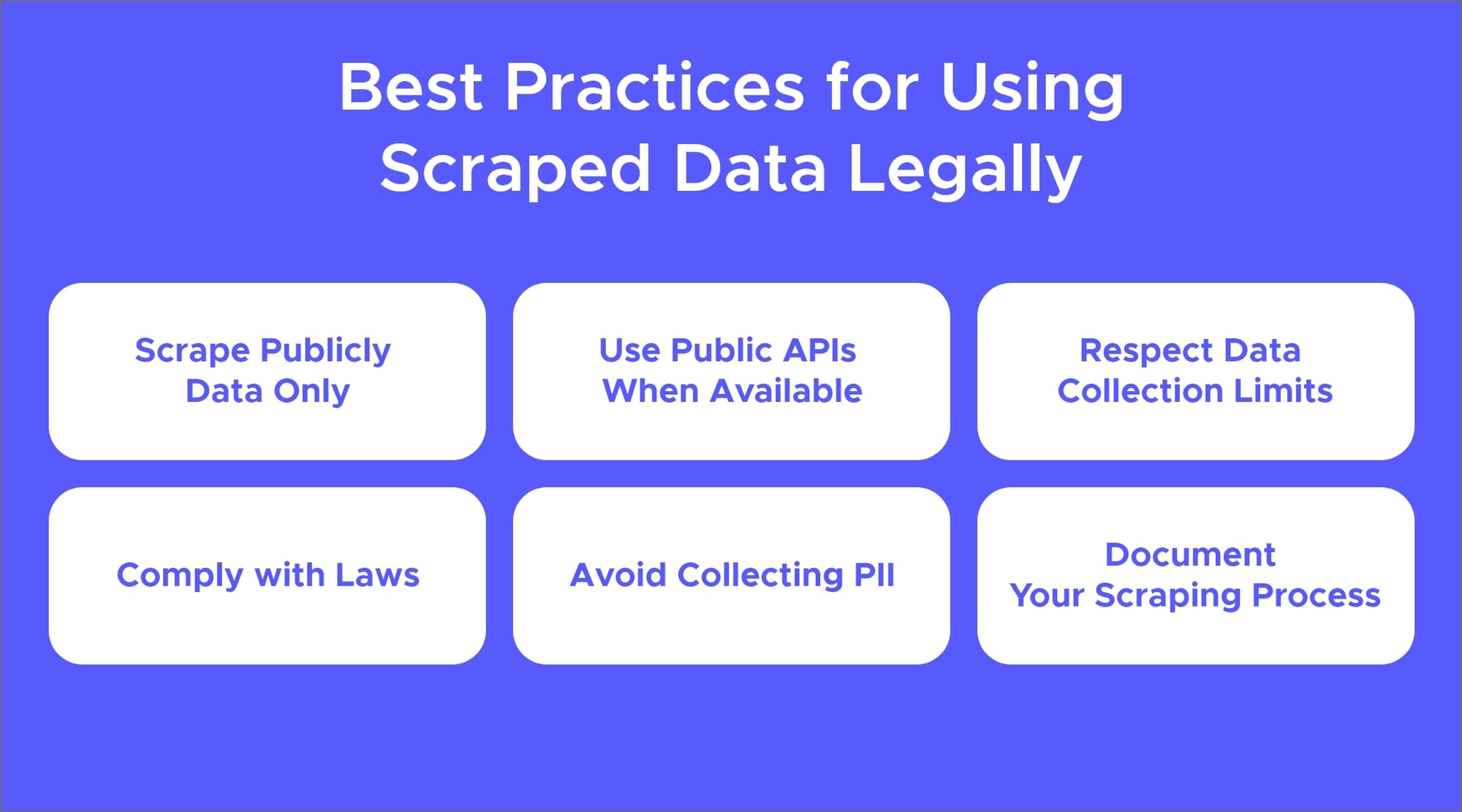
1. Scrape Publicly Accessible Data Only
Ensure you’re scraping data that is publicly available and not hidden behind login walls or protected by CAPTCHAs. Scraping private or restricted data can violate data protection.
2. Use Public APIs When Available
If the platform provides an API (such as LinkedIn or Indeed), use it instead of scraping. APIs are designed to offer authorized access to data while ensuring you follow the platform’s rules. This greatly reduces the risk of being blocked or banned.
3. Respect Data Collection Limits
Even when scraping public data, don’t overwhelm the platform’s servers with too many requests. Overloading a site can be seen as a form of trespassing and could lead to legal consequences. Make sure to space out your requests to avoid impacting the platform’s performance.
4. Comply with Local and International Laws
Always be aware of local laws governing data protection in the region where you’re scraping. For example, in the European Union, GDPR imposes strict regulations on the collection of personal data. Non-compliance can result in hefty fines.
5. Avoid Collecting Personally Identifiable Information (PII)
Focus on gathering non-personalized job data. Collecting personal information like names, emails, or phone numbers without consent is illegal in many places, including under GDPR and CFAA. Stick to scraping non-sensitive job data to remain within legal and ethical boundaries.
6. Document Your Scraping Process
Keep clear records of your scraping activities, including data sources, methods, and frequency. This can help ensure compliance and provide transparency if disputes arise. Some platforms may ask for this documentation to verify that you are following their TOS.
Staying informed and following best practices can help you navigate the legal complexities of job scraping and avoid the risks.
Mantiks: The Intelligent Approach in Scraping Data
French company Mantiks gives you the decision-maker contacts, insights into the job market trends, and the hiring signals-you need everything, while maintaining clear legal boundaries.
With Mantiks, you don't just purchase scraped data, you get it right, fully compliant and hassle-free.
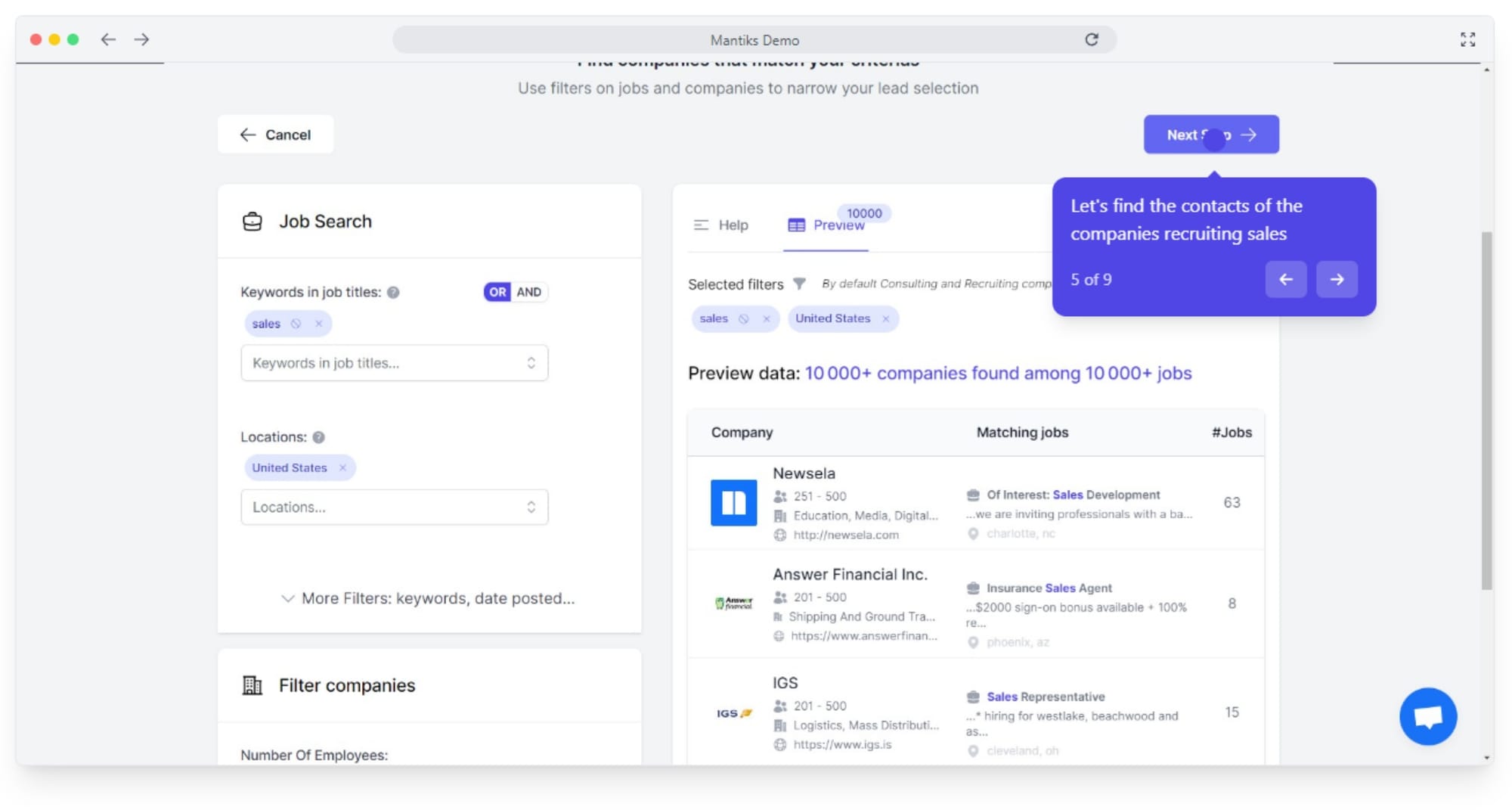
FAQ: Legality of Job Scraping
Is it legal to scrape job postings?
Scraping job postings is sometimes legal, depending on the platform’s TOS and if the data is public.
Can I get in trouble scraping job boards?
Yes, you can get in legal trouble if you violate laws like CFAA or GDPR or Platform TOS.
What are the legal alternatives to scraping job data?
Using official APIs or paid data access solutions like Mantiks is a legal alternative.
Finnally, Job scraping is valuable but legality varies by platform and region. CFAA in US and GDPR in EU is a must. Ethical methods like public APIs ensures compliance and avoid penalties.
For a detailed guide about how job scraping works, check out our article: "Job Scraping Guide”.
About the author

Alexandre Chirié
CEO of Mantiks
Alexandre Chirié is the co-founder and CEO of Mantiks. With a strong engineering background from Centrale, Alexandre has specialized in job postings data, signal identification, and real-time job market insights. His work focuses on reducing time-to-hire and improving recruitment strategies by enabling access to critical contact information and market signals.
